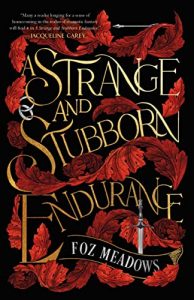Maya C. James Reviews A Strange and Stubborn Endurance by Foz Meadows
 A Strange and Stubborn Endurance, Foz Meadows (Tor 978-1-25082-913-9 Tor. 544 pp, hc July 2022).
A Strange and Stubborn Endurance, Foz Meadows (Tor 978-1-25082-913-9 Tor. 544 pp, hc July 2022).
Content warning: rape, sexual assault.
A Strange and Stubborn Endurance has a lot going on: court politics, diplomatic disasters, arranged marriages, and a bit of magic sprinkled throughout. A lot going on isn’t always a bad thing, but in this case, it’s certainly a lot to mull over. Lord Velasin vin Aaro, a gay Ralian nobleman, has recently been outed by his abusive ex-lover to his family and the entire Tithenai envoy. Fearful that his recently arranged marriage to a Tithenai royal is at stake, he is shocked to learn that there is an alternate arrangement available – one where he marries the Tithenai woman’s brother, Caethari, instead. Shocked at the proposal, Velasin hastily agrees despite knowing nothing of his future husband (spoiler: he’s hot and stoic, but also emotionally available). In addition to healing from a recent trauma, and being disowned by his homophobic father, a mysterious faction is also trying to murder Caethari, and is getting closer to succeeding each day. If their marriage fails, or if the faction succeeds, the shaky alliance between Ralia and Tithena may fail all together.
A Strange and Stubborn Endurance is a m/m fantasy romance that certainly delivers on the romance; there are clear villains, ex-lovers, and well-paced lust-to-love between Velasin and Caethari. Like many other m/m arranged marriage novels, we expect the couple to fall in love somehow, it is merely a matter of how quickly, and through what unexpected circumstances. Here the drama picked up so quickly that I wished I had two more chapters to go back to for reference. Like the opening of a second novel in a trilogy, there was quite a bit of exposition in the opening arc and a large cast of characters to catch up with. Court politics are played out through extended inner monologues with brand new characters. We don’t experience much of the world beyond the palace, either, so I found myself clinging to brief, beautiful prosaic scenes that Meadows writes quite nicely.
Another major and immediate part of Velasin’s journey is his recovery from rape. While the scene in the opening of the novel was appropriately prefaced with a content warning, it unfortunately felt more like trauma porn than a meaningful plot device to me. Considering how understandably sensitive a topic male rape is, particularly when sex between two men is often demonized, I wrongly assumed that the violent rape coinciding with the main character’s sexual outing would be handled in a more careful manner, rather than its clumsy inception and underwhelming continuation. This conflict overshadows quite a bit of A Strange and Stubborn Endurance, as the rapist is given too much time on paper. I did enjoy the humanizing portrayal of Velasin’s healing from the traumatic event, and how other characters supported him throughout the journey. Unfortunately, I still found myself overwhelmingly disappointed in sexual assault being a mere plot device, as it is so often (ab)used in genre fiction.
I had trouble connecting with, or being interested in, any of the main characters, particularly Velasin, for whom I so desperately wanted deeper character development. He is seemingly measured by his trauma, rather than his interests, intellect, or abilities. Whether that is the intent for character development is unclear, but it certainly marked my reading experience. This is in opposition to supporting characters like Keletha, who were better fleshed out and interesting to read, even with their own trauma and issues to sort out. Markel, too, had a stronger personality than Velasin, from his body language to his daily habits and unique ways of speaking. The side characters, when given the space to breathe, increased the stakes of the failure of this marriage, rather than Velasin or Caethari being the main drivers of the political conflict.
Part Two makes an unexpected and welcome point of view change to Velasin’s betrothed, Caethari, or Cae for short. While plot points are still explored through internal monologues for the most part, it is done so in a more compelling manner here. We learn about Cae’s interests and habits in what feel like natural ways. There is a curious choice to switch to third person for Cae and first person for Velasin’s chapters. This stylistic choice took a minor amount of adjustment when moving between their narratives, but nonetheless was a creative and unusual point of view that I respected. Meadows writes with clear conviction that is admirable to witness.
While I enjoyed the romantic elements, I never quite found my footing in the palace intrigue and politics, or the cultural differences between Ralia and Tithena, particularly as it is based upon the Byzantine Empire. I thought I would enjoy the freedom Velasin would find, moving from a repressive society to an accepting society, but there was no real explanation why hateful views about queer people were seemingly limited by borders. I wanted to understand how these differences emerged on a deeper, human level, and why these ways of being were so starkly segregated when Tithena and Ralia were so close together, geographically. The court politics, too, managed to be quite dull despite all the potential for drama. If Ralia is as homogenously homophobic a society as Meadows writes, it was unclear to me why their potential demise, or inability to ally themselves with Tithena, was of my concern. Rather, my concern lay primarily in Velisan and Markel’s friendship. I wish I had gotten a chance to read more of it, as the book shone brightest in tender moments of care between Velisan and his other non-romantic relationships. At a certain point I cared about Velisan and Cae’s relationship, but only after getting halfway through the book. Moreover, the physical attraction between them was thinly built. The only part of their romance that kept me reading (aside from some magnetic and well-written open-door sex scenes) was the emotional intellect of their conversations through the “arranged lovers fall in love” trope.
A Strange and Stubborn Endurance has all the ingredients for a stellar fantasy romance. I still found myself wanting more depth rather than length, but ended the book with a deep respect for the topics that Meadows engages with.
Maya C. James is a graduate of the Lannan Fellows Program at Georgetown University, and full-time student at Harvard Divinity School. Her work has appeared in Star*Line, Strange Horizons, FIYAH, Soar: For Harriet, and Georgetown University’s Berkley Center Blog, among others. She was recently long listed for the Stockholm Writers Festival First Pages Prize (2019), and featured on a feminist speculative poetry panel at the 2019 CD Wright Women Writer’s Conference. Her work focuses primarily on Afrofuturism, and imagining sustainable futures for at-risk communities. You can find more of her work here, and follow her on Twitter: @mayawritesgood.
This review and more like it in the August 2022 issue of Locus.
 While you are here, please take a moment to support Locus with a one-time or recurring donation. We rely on reader donations to keep the magazine and site going, and would like to keep the site paywall free, but WE NEED YOUR FINANCIAL SUPPORT to continue quality coverage of the science fiction and fantasy field.
While you are here, please take a moment to support Locus with a one-time or recurring donation. We rely on reader donations to keep the magazine and site going, and would like to keep the site paywall free, but WE NEED YOUR FINANCIAL SUPPORT to continue quality coverage of the science fiction and fantasy field.
©Locus Magazine. Copyrighted material may not be republished without permission of LSFF.







